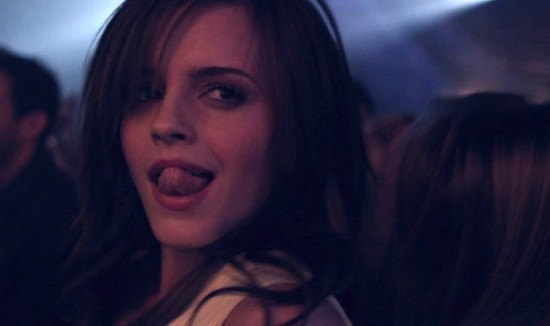In 2011 a crack burglary ring was sentenced to prison by a Los Angeles court for a series of crimes they most certainly committed. This group of mostly girls had burglarized the homes of nearly a dozen high-profile celebrities, making off with nearly $3 million in clothes and jewelry. Today, a film based on their exploits is being shown in theatres. If you can find it, if there’s little else playing or you’re tired of hearing about Man of Steel, maybe you can see The Bling Ring.
I write that because I’m still not sure what Sofia Coppola’s new movie is about — it opens with Nicki (Emma Watson) giving one of those humanitarian speeches that clearly wasn’t proof-read by an attorney and has about as much basis in thought as — Ooo! A penny! And then follows Marc (Israel Broussard), the awkward new kid at the remidial school. He’s mocked and picked on, partly because he’s the new kid, partly because he harbors some cross-dressing tendencies.
Fortunately one of his classmates, Rebecca (Katie Chang) befriends him and, during a casual drive, asks which if any of friends are out of town. He mentions one. She suggests they break into the house. And they do. And they steal some cash, clothes, and jewelry. They meet up with some other friends afterwards and brag about robbing the poor saps.
And eventually the gang gets the idea to rob celebrities’ houses. Their plan is ingenious — track when a particular celebrity will be away, say for a party or box social. Then go to Google to look up their address. Then go there when the celebrity is not there. And then rob them blind. Paris Hilton is their first and most popular target, for a reason that provides one of the film’s best jokes, so I won’t reveal it here.
But that’s basically the film — following robbery after robbery after robbery after robbery after robbery — and I think there’s some I missed, too. Whatever Coppola finds so fascinating about this concept is never clearly revealed, but she does, and she delights in filming each caper, from the slight planning to the break-in (or, in many cases, wander-in), the girls (and guy) dressing up in the dubs of the rich and famous and rattling off the names of brands whose products evidently cost the GNP of small European countries, and then enjoying the spoils at home. They smoke and drink and party all nights as well.
Naturally it’s a bit difficult to put myself in the place of a materialistic teenage girl; I’m the wrong gender, and shoes with exotic names don’t exactly blow the skirt I’m not wearing up. Granted some of the heists are gorgeous to watch — particularly one shot exclusively from the outside, and in one take that shows Coppola’s been watching some Jacques Tati. And Watson is fine as Nicki, devoid of decency and self-doubt, ensconced in a world that hasn’t any room for other humans. Leslie Mann is a welcome surprise, too, but, as with the robberies, her constant New-Age/The-Secret-obsessed schtick wears itself out quickly.
But again, what is the point? Coppola said the story resonated with her because “It says something about our culture.” What is that? Or rather, what is she saying it says? Despite the endless parade of expense, I don’t think she’s been sucked in by the very excess she seems to want to condemn. Even when she went all bubble-gum-girly-pop before in Marie Antoinette, she grounded that film with a rather sympathetic portrayal of her subject. The girls here have no such depth — nor any reason for their crimes other than ability; that they can justifies their doing so. They learn no lessons, feel no remorse and even less loyalty, and…and talk vapidly. So yes, people like this may exist. What of it?
Perhaps the message is that there is no message — maybe the emptiness is the point. Maybe I’m just looking too deep into shallow puddles.


Dan O.
June 23, 2013 at 9:26 amGood review Nat. Coppola’s style kept this movie interesting, but everything and everybody else felt like they were just dragging it down to it’s feet.